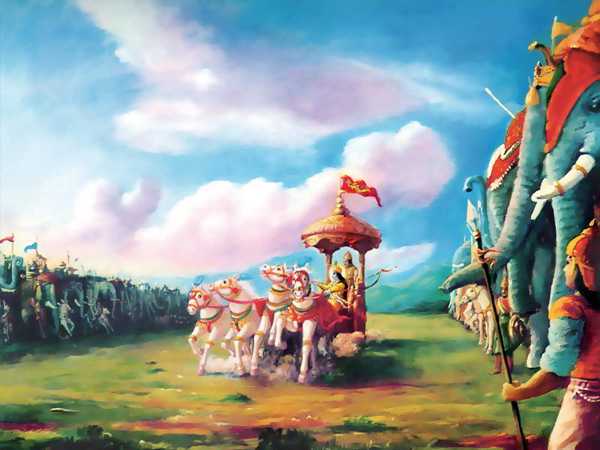Chapter 106

“Janamejaya said, ‘Interminably wedded to evil, blinded by avarice,addicted to wicked courses, resolved upon bringing destruction on hishead, inspiring grief in the hearts of kinsmen, enhancing the woes offriends, afflicting all his well-wishers, augmenting the joys of foes,and treading the wrong path, why did not his friends seek to restrainhim, and why also did not that great friend (of Kuru’s race), the holyOne; with tranquil soul, or the Grandsire tell him anything fromaffection?’
“Vaisampayana said, ‘Yes, the holy one did speak. Bhishma also spoke whatwas beneficial. And Narada too said much. Listen to all that these said.’
“Vaisampayana continued, ‘Narada said, ‘Persons that listen to thecounsels of friends are rare. Friends again are rare that offerbeneficial counsels, for a friend (in need of counsel) is never therewhere a friend (offering counsel) is. O son of Kuru’s race, I think, theword of friends ought to be listened to. Obstinacy ought to be avoided;for it is fraught with great evil. In this connection is cited an oldstory regarding Galava’s having met with disgrace through obstinacy. Inancient times, in order to test Viswamitra, who was then engaged inascetic austerities Dharma personally came to him, having assumed theform of the Rishi, Vasishtha. Thus assuming, O Bharata, the form of theone of the seven Rishis, and feigning himself hungry and desirous ofeating, he came, O king, to the hermitage of Kausika. Thereupon,Viswamitra struck with awe, began to cook Charu (which was a preparationof rice and milk). And in consequence of the care he took in preparingthat excellent food, he could not properly wait upon his guest. And itwas not till after the guest had dined on the food offered by the otherhermits that Viswamitra succeeded in approaching him with the Charu hehad cooked and which was still steaming. ‘I have already dined; waithere,’–were the words that the holy one said. And having said that theholy one went away. And thereupon, the illustrious Viswamitra, O king,waited there. And bearing that food on his head and holding it with hisarms, that ascetic of rigid vow stood in his hermitage, still as a post,subsisting on air. And as he stood there, an ascetic of the name ofGalava, from motives of respect and reverence and from affection anddesire of doing what was agreeable, began to wait upon him. And after ahundred years had passed away, Dharma, again assuming the form ofVasishtha, came to Kausika from desire of eating. And beholding the greatRishi Viswamitra, who was endued with high wisdom, standing there withthat food on his head, himself subsisting all the while on air, Dharmaaccepted that food which was still warm and fresh. And having eaten thatfood, the god said,–Gratified am I, O regenerate Rishi. And saying this,he went away. And at those words of Dharma, Viswamitra divested ofKshatriyahood because endued with the status of a Brahmana and was filledwith delight[12]. And pleased as he was with the services and devotion ofhis discipline, the ascetic Galava, Viswamitra, addressed him and said,’With my leave, O Galava, go whithersoever thou mayest wish.’ Thuscommanded by his preceptor, Galava, highly pleased, said in a sweet voiceunto Viswamitra of great effulgence, What final gift shall I make thee inconsequence of thy services as preceptor? O giver of honours, it is inconsequence of the (final) present that a sacrifice becometh successful.The giver of such gifts obtains emancipation. Indeed, these giftsconstitute the fruit (that one enjoys in heaven). They are regarded aspeace and tranquillity personified. What, therefore, shall I procure formy preceptor? Oh, let that be said. ‘The illustrious Viswamitra knew thathe had really been conquered by Galava by means of the latter’s services,and the Rishi, therefore, sought to dismiss him by repeatedly saying,’Go, Go.’ But thou repeatedly commanded by Viswamitra to go away, Galavastill addressed him saying, ‘What shall I give?’ And seeing thisobstinacy on the part of ascetic Galava, Viswamitra felt a slight rise ofanger and at last said, ‘Give me eight hundred steeds, every one of whichshould be as white as the rays of the moon, and every one of which shouldhave one ear black. Go now, O Galava, and tarry not.'”




